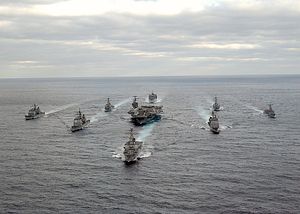So the father of a strategy that he admits isn’t a strategy is upset with those who point out that the strategy isn’t a strategy?
Glad we cleared that up.
Over at War on the Rocks, retired U.S. Navy captain (and recently retired poobah of naval warfare studies here in Newport) Robert “Barney” Rubel is objecting to… something. He reviews the history of the framing of the 2007 U.S. Maritime Strategy while lamenting the sea services’ fitful progress toward “refreshing” — a.k.a. revising — that directive for circumstances that have changed dramatically in ensuing years. He proclaims that “critics” — including yours truly, apparently, judging from his weblinks — are “wrong” to fault the Maritime Strategy and its successor, now years in the making, for not being strategies per se.
Weirdly, though, Dean Rubel next concedes that the document… isn’t a strategy per se. It’s more an effort at outreach toward the American people and their elected representatives, and a diplomatic overture to foreign governments. In other words, the Maritime Strategy offers a way to coax taxpayers into investing adequately in their seagoing forces. It does so while furnishing current and would-be coalition partners political cover to work with America as co-guardians of the maritime commons. Depicting maritime strategy as a cooperative venture is helpful that way.
Barney vouchsafes, moreover, that the document’s drafters only “dimly perceived and understood” the geopolitical, diplomatic, and domestic-political purposes underlying it. And he goes on to predict that no refreshed strategy — despite the strategic prowess he discerns with the naval establishment — will qualify as a strategy either. Not only does this add up to an impressive feat of semantic acrobatics, it also provides cold comfort to navy staffers toiling over handiwork that’s evidently destined to disappoint. Lord, save me from allies like that!!!
A recap of my views on the 2007 Maritime Strategy, just for the record. One, yes, I have pointed out that it’s a strategic concept, not a strategy. That’s more of a semantic point than a substantive one, though. Strategic concepts have an honorable tradition. Indeed, the late, great Sam Huntington maintained that navies need strategic concepts lest they find themselves intellectually rudderless in times of peace, uncertain resources, and remote-seeming threats. The 2007 strategy imparts a sense of direction, no matter what label you stick on it.
Two, there’s a lot to like about the Maritime Strategy. It elevates custodianship over the commons to equal standing with combat functions. It states where the primary theaters of U.S. nautical endeavor lie, namely the Western Pacific and greater Indian Ocean. It decrees that the sea services will stage “credible combat power” in these expanses for the foreseeable future, helping win or, better yet, ward off armed conflict. And it leaves no doubt that the United States intends to remain numero uno on the high seas. Limiting the number of commitments while concentrating resources to uphold those commitments is a sign of self-discipline — a virtue world powers commonly flout.
Such elements are laudable. I hope this pivot-strategy-before-the-pivot-policy endures into the revised Maritime Strategy. Now, I do think, and have written, that the strategy’s framers missed some implications of what they published. Surveying history, for example, we find that one maritime hegemon generally acts as steward of sea-lane security. Rallying a standing consortium to police the oceans thus constitutes a revolutionary act — a doubly trying act for a dominant seafaring state that’s no longer dominant enough to get its way by fiat. It’s unclear whether sea-service leaders fully grasp the magnitude of the naval-diplomatic challenge they undertook in 2007. They must, lest the enterprise fracture under the weight of partners’ competing interests and purposes.
Lastly, Barney seems to have gotten a bee under his bonnet over my questioning whether the U.S. Navy grooms strategists in adequate numbers. Forming the habit of strategic thought should start at a tender age. If there’s evidence that the navy gives junior officers time or has adjusted career incentives to encourage them to study strategy, someone should produce it. It would gladden my heart — if I didn’t keel over from the shock first.
This is an elementary point. Sailors typically have more work to do on sea duty than they can do. They have inspections to pass, watches to stand, warfare qualifications to earn, and on and on. Where would they find time to pore over Clausewitz or Mahan? One doubts things have improved since those thrilling days of yesteryear when the Naval Diplomat wore the uniform. Indeed, in this age of “minimal manning,” fewer people are expected to execute much the same work while keeping up an operational tempo that makes Cold War days look slack. If mid-career Naval War College students have glad tidings of leisurely workdays, they’re mighty closemouthed about it.
The navy’s silence about such matters speaks volumes. To their credit, though, service chieftains have instituted a “Navy Strategic Enterprise” in recent months. They tacitly acknowledge we have a problem in the strategic realm. And admitting you have a problem is the all-important first step toward recovery. With sufficient attention, creativity, and energy from top leadership, American sea fighters may yet recover their deep-thinking past.
Let’s hope so.

































